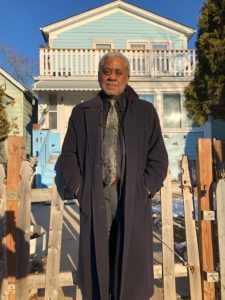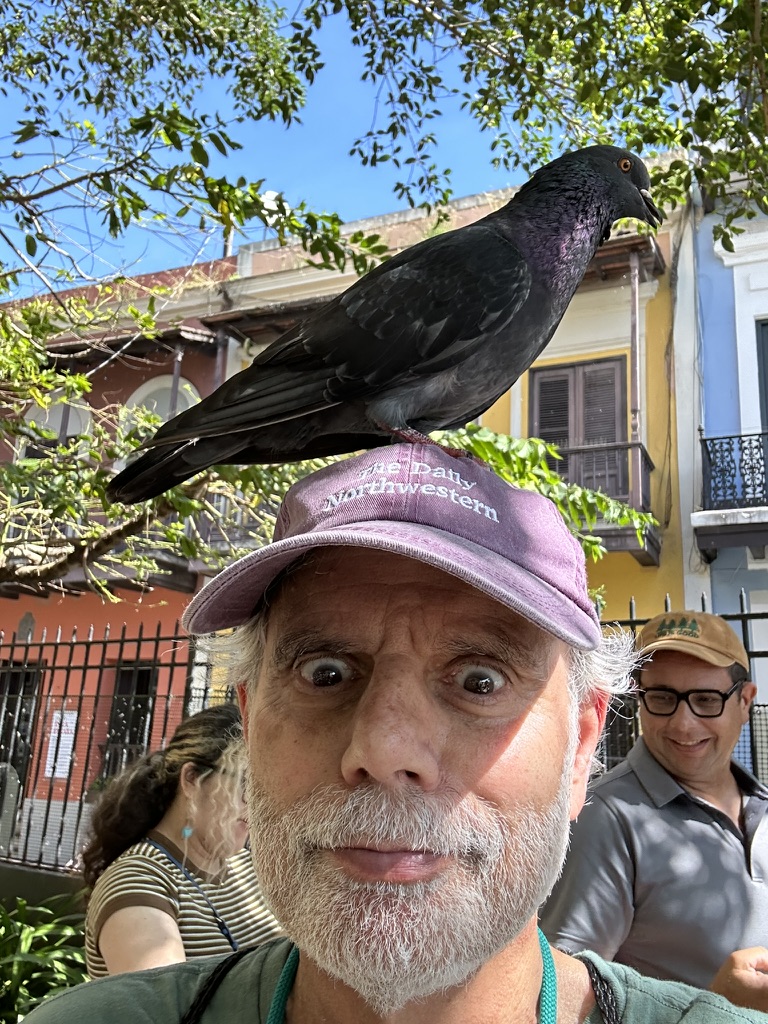Evanston RoundTable, March 5, 2020
Award-winning author Charles Johnson returned to Evanston, where he was born and grew up, to address an appreciative audience at Fleetwood-Jourdain Community Center on Feb. 29 about his book “Middle Passage.” A play adapted from the novel is currently at Lifeline Theatre in Rogers Park.

After a re-enactment of the opening scene by the production’s lead actors Michael Morrow and Shelby Lynn Bias, Dr. Johnson was introduced by his cousin Bettye Cohns. She said as a youngster she loved and admired her older “Cousin Chuckie.” “He was always drawing, reading, working, pursuing his dreams, not out on the street,” said Ms. Cohns, who still lives in Evanston and is Executive Director of the Reba Early Learning Center. “He was a great listener and always took time to talk to me. He was thoughtful and insightful, a real role model,” she added.
“There’s only one person in the world who can get away with calling me Chuckie, and that’s Bettye,” Dr. Johnson said to laughter as he took the stage. “To everyone else, it’s Chuck.”
Dr. Johnson was interviewed by Shelley Spencer, an award-winning writer and producer and Director of On-Air Fundraising at WTTW. She started by asking what made Evanston special when he was growing up in the 1950s and 1960s. He said it was “a good place, a safe place” that “shaped my values and perspectives on life in a positive way.”
He especially credited his parents and relatives, including his great Uncle William Johnson, whose construction company built a local church and apartment buildings and provided jobs for members of the Johnson family who came up from South Carolina to work there.
“Middle Passage” won the National Book Award for fiction in 1990. Dr. Johnson said he wrote a first draft of the book in 1971, when he was still an undergraduate at Southern Illinois University, but put it aside to improve his writing skills and do more research on the African slave trade. He returned to it in earnest in 1983 and worked on it for six more years before publishing the novel in 1990. He said he went through numerous drafts and ultimately discarded some 3,000 pages during the revision process.

“People imagine a book springs from your head like Athena from the head of Zeus,” he said. “No!”
He said the book starts out as a “rousing sea adventure and picaresque” tale about the protagonist, Rutherford Calhoun, a freed slave in 1830s New Orleans. “Rutherford is free but doesn’t yet understand the responsibilities of freedom,” said Dr. Johnson. The book follows Rutherford’s adventures as a stowaway and reluctant crew member on a slave ship, enduring a rebellion of the imprisoned slaves and a revolt of the crew against the onerous captain. At the end a more mature Rutherford is ready to embrace the romance he fled at the beginning of the novel.
Dr. Johnson said that in most depictions of the journey across the so-called middle passage from Africa to America, enslaved Africans were “voiceless and faceless, basically chattel. I tried to individualize them, to give them some dimension and show them, as well as the captain and crew, changing.”
One of the book’s more vivid characters is “Papa Zeringue,” an African American part-owner of the slave ship. Asked by Ms. Spencer about Papa’s complicity in the slave trade, Dr. Johnson pointed out that one of the first Africans to arrive in America, Anthony Johnson, was an indentured servant who eventually owned slaves himself. “We have a very simplistic notion of slavery,” he said, calling it an institution of “great complexity and every possible human interaction…it was called the ‘peculiar institution’ because of its peculiar ambiguity and gray areas.”
The National Book Foundation, which administers the National Book Award, called it “a savage parable of the African American experience” and the New York Times said it was “in the tradition of ‘Billy Budd’ and ‘Moby-Dick’…heroic in proportion…fiction that hooks the mind.” A reviewer on Goodreads called it a “daring voyage of horror and self-discovery… a perfect blend of the picaresque tale, historical romance, sea yarn, slave narrative, and philosophical novel.” The Chicago Tribune wrote “Long after we’d stopped believing in the great American novel, along comes a spellbinding adventure story that may be just that.”
Several film studios have approached Dr. Johnson about adapting the book into a movie, the most recent and promising by John Singleton, director of “Boyz n the Hood.” But Mr. Singleton died last year before a contract could be signed. In the meantime, Dr. Johnson said, the book is being made into a graphic novel with additional scenes that take place in Africa, illustrated by the renowned artist Denys Cowan.
One question from the audience was about the current controversy over “cultural appropriation,” the use of ethnic identities and stories by someone outside that ethnicity. A recent example is the novel “American Dirt,” about a mother and son struggling to flee drug violence in their native Mexico. The book has been criticized because the author, Jeanine Cummings, is not Latinx.
Dr. Johnson, who has lived in Seattle since 1976, said his 2018 short story collection “Night Hawks” portrayed all kinds of people and experiences. “I believe if you open your heart to others and listen carefully, if you’ve done your research and can imaginatively project, you should be able to write about anything.”
In response to an audience question Dr. Johnson said he “grieved and bemoans” school cutbacks in the humanities and the arts. “We are turning our back on thousands of years of our intellectual inheritance,” he said. “Civilization could be lost in 20 years if we’re uninterested in the past. It would be like inventing the wheel all over again.”
About why he writes, he said it’s not for money or fame, but rather the ability to get something right. “I’m a better person for writing.” The act of writing and revising “is how I can achieve my best thoughts, feelings and technique. If it takes five years [to produce a book], it’s worth it. Art is the only place where people have full control—over every word, every syllable, every meter, every beat.” As a practicing Buddhist, he said it’s “important to get me out of the way of my characters so they can come to life, to let them speak.”
Aside from the Fleetwood-Jourdain presentation, Dr. Johnson saw “Middle Passages” at Lifeline and led a Q&A session with the audience after another performance. Asked about the current production, which was adapted from the book by actor and playwright David Barr and Lifeline Artistic Director Ilesa Duncan, he said it was “thrilling and fascinating to see it. I had to restrain myself from mouthing the lines along with the cast!”
On a more personal level, he visited some of his old Evanston haunts, including his childhood home at 1321 Dodge, two blocks south of the high school, as well as some of the homes and the church his uncle built, and even the neighborhood where he home delivered the Tribune.
Aside from “Middle Passage,” Dr. Johnson is the author of four other novels, two books of philosophy (he has a doctorate in philosophy from Stony Brook University), four short story collections, three volumes of children’s literature, nine non-fiction books and two collections of drawings and political cartoons. His next book, the non-fiction “Grand: A Grandparent’s Wisdom for a Happy Life,” is due out in May.





+ There are no comments
Add yours